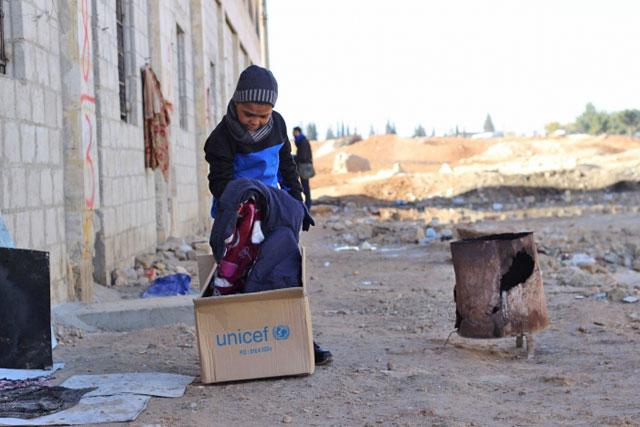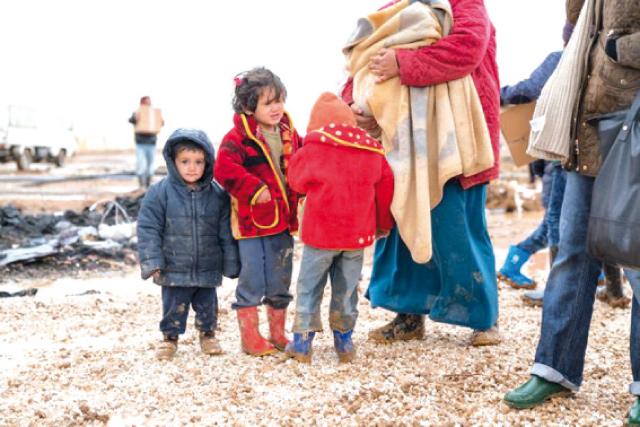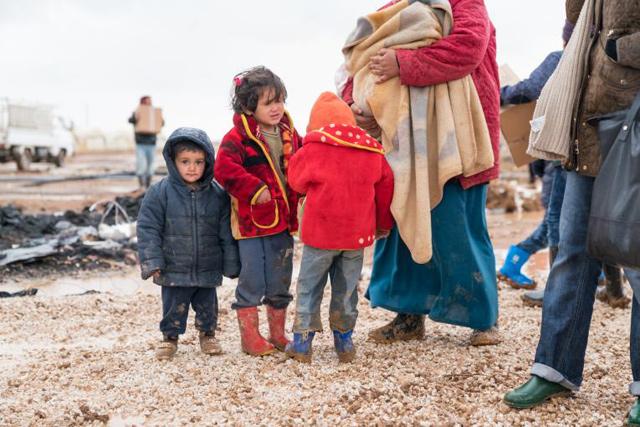You are here
UNICEF urges more funding ahead of winter season
By Camille Dupire - Oct 30,2017 - Last updated at Oct 30,2017

UNICEF Jordan provides warm winter clothes for children through the 230 Makani centres across all 12 governorates (Photo courtesy of UNICEF)
AMMAN — As temperatures are lowering with the approach of winter, UNICEF has launched a call for funding to help support its winter assistance programme for vulnerable children across the region.
“This is a joint appeal to donors to help bridge the funding gap we are facing to implement our ‘winter response’,” Juliette Touma, communication officer at UNICEF Regional Office told The Jordan Times over the phone.
To date, UNICEF has received less than 20 per cent of the $73 million required to cover the winter needs of the most vulnerable children affected by the crisis in the region, according to a UNICEF statement.
While the organisation expects to provide winter clothing kits to over 800,000 children across the region, cash vouchers to over 320,000 vulnerable children and their families and thermal blankets for almost 240,000 children, the assistance is still below the level needed, the statement noted.
“We have just started our winter programme in Jordan, which is implemented through a dual approach: the winter cash programme for Syrian refugees living in camps and the distribution of winter clothes for all vulnerable groups across Jordan,” said Miraj Pradhan, communication officer at UNICEF Jordan, who noted that the clothes are provided through the 230 Makani centres that UNICEF partners with across all 12 governorates.
“Without help, the cold could be yet another harsh blow to vulnerable children in the region who have already been through so much,” said Geert Cappelaere, UNICEF regional director for the MENA region, adding that “children’s health is weak from undernutrition, poor healthcare and displacement. Hypothermia and respiratory infections are a serious threat – if left untreated, children will die”.
As UNICEF races to deliver the necessary items to vulnerable population before the cold sets in, the organisation is still facing a $60 million gap that could leave up to 1.5 million children exposed to the cold, most of whom are refugees or internally displaced.
Refugees tend to hit the hardest by the cold season, since they are living in substandard or inadequate shelters, which are poorly insulated and expensive to heat. Low temperatures, storms and heavy snowfall are therefore expected to compound the many hardships they are already facing, the statement said.
Stressing the overall impact of winter on various aspects of their daily lives, Touma said: “Children’s education and health are directly affected when kids are not well equipped against the winter. School dropouts tend to increase and cases of spreadable diseases rise.”
To counter that, UNICEF set up child-friendly spaces and school heating for 105,000 children across the region.
“We try to provide these families with all the items before the winter starts, so they can be ready when temperatures start plummeting,” Touma explained, citing the importance of providing fuel for heating purposes in addition to the clothing items.
Working in collaboration with UNICEF and UNHCR, the Norwegian Refugee Council (NRC) has started distributing cash assistance to the families of vulnerable children living in the refugee camps, in order to enable these households to meet their most basic needs in a flexible and dignified way, according to NRC Jordan’s shelter specialist Elias Jourdi.
The winter packages, which are categorised into different child age groups, are delivered in partnership with the Ministry of Social Development, UNHCR, ACTED, Islamic Centre Charity Society Jordan, INTERSOS, NRC, Save the Children Jordan and World Vision.
Related Articles
AMMAN — With cold weather conditions due imminently, UNICEF has launched a $6 million Winter Children’s Appeal to help prevent a devastating
AMMAN — Socio-economic impacts of prolonged movement restrictions and the closure of all community and learning facilities have been particu
UNICEF Jordan on Wednesday announced that up to 80,000 Syrian refugee children in Jordan will receive cash assistance under the agency’s winterisation programme.













